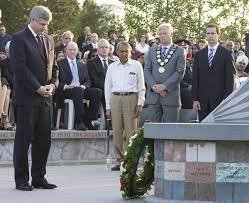Relations between India and Canada have hit their lowest point in decades, prompting former diplomats to advocate for a shift in Canada’s approach to the Khalistan issue as a crucial step toward a potential reset in bilateral ties. Citing the 2010 apology issued by former Canadian Prime Minister Stephen Harper, experts argue that such gestures are vital to healing historical wounds.
Harper’s historic apology was delivered during a solemn ceremony at the Air India memorial in Humber Bay Park, Toronto, marking the 25th anniversary of the tragic 1985 Air India ‘Kanishka’ Flight 182 bombing. The explosion, resulting from a bomb placed in the luggage, claimed 329 lives, including 280 Canadian citizens, making it one of the deadliest acts of aviation terrorism in history.
In a poignant address, Prime Minister Stephen Harper acknowledged the gravity of the atrocity, stating, “Some wounds are too deep to be healed even by the remedy of time.” He further admitted that the bombing was “an atrocity conceived in Canada, executed in Canada, by Canadian citizens, and its victims were themselves mostly citizens of Canada.”
This candid acknowledgment marked a significant departure from the stance of Prime Minister Brian Mulroney, who, at the time of the incident, had extended condolences to Prime Minister Rajiv Gandhi of India, a move that had garnered criticism from the Indian community in Canada.
The Khalistan issue, which centers on the demand for an independent Sikh state, has been a longstanding point of contention between the two nations. While Canada has a vibrant Sikh community, some elements within it have been accused of supporting Khalistani separatism.
Former diplomats and experts believe that revisiting Canada’s response to the Khalistan issue could pave the way for improved relations with India. They point to the Harper apology as an example of a constructive step taken in the past, emphasizing the importance of acknowledging historical wrongs and working toward reconciliation.
The strained ties between India and Canada have ramifications that extend beyond diplomatic relations, affecting trade, cultural exchange, and people-to-people connections. As calls for a recalibration in Canada’s approach grow louder, the path to a potential reset in bilateral relations remains uncertain but underscores the need for a thoughtful and strategic reevaluation.
News Summary:
- Former diplomats emphasize the necessity of a change in Canada’s approach to the Khalistan issue amidst strained relations with India.
- The 2010 apology by former Canadian Prime Minister Stephen Harper for the 1985 Air India ‘Kanishka’ Flight 182 bombing is cited as a precedent for constructive steps.
- Harper’s apology marked a significant departure from the stance of former Prime Minister Brian Mulroney, who extended condolences to India at the time.
- The Khalistan issue, related to demands for an independent Sikh state, has been a long-standing point of contention between the two nations.
- Strained India-Canada ties have broader implications for trade, cultural exchange, and people-to-people connections.


